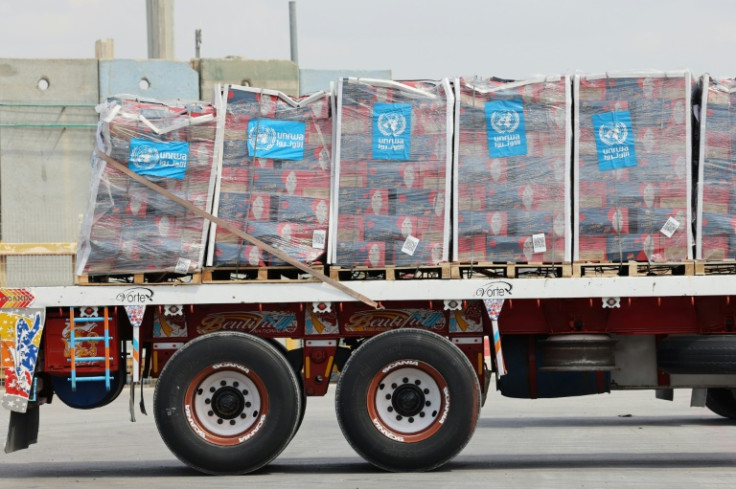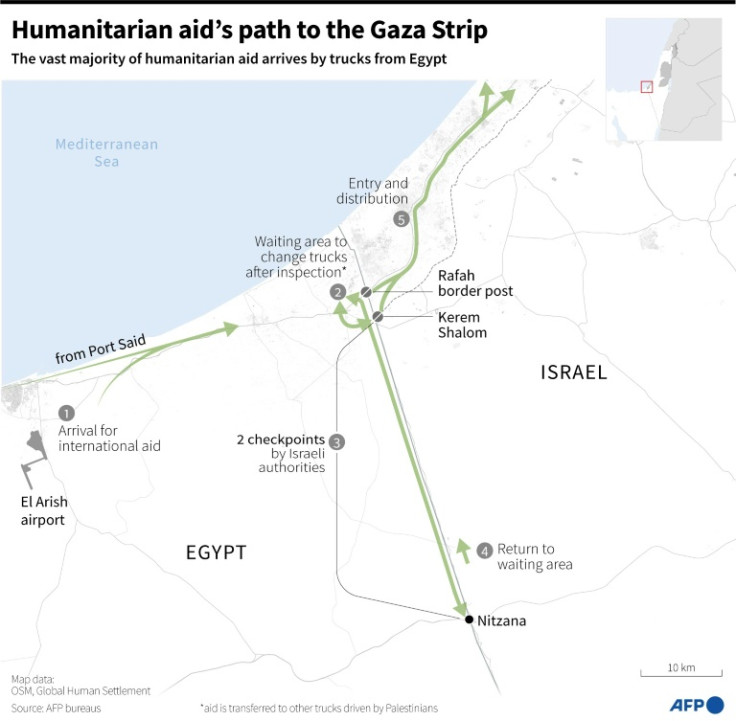Israel Due To Respond To Court Petition On Gaza Aid Increase

Israel faces a Wednesday deadline to present to the country's top court measures to increase aid into the besieged Gaza Strip, where hunger is spreading after more than six months of war.
Five non-profit groups have taken the state to court, accusing authorities of restricting the entry of relief items and failing to respect their "obligations as an occupying power" to provide basic necessities to Gazans.
Israel, which has been fighting militants in the Hamas-ruled territory since the October 7 attack, has insisted it does not limit aid supplies and blames shortages on a lack of distribution by aid agencies and charities within Gaza.
"Contrary to Israel's claims that there was no limit on entry of aid to Gaza, several policy choices are hindering" aid delivery, said Miriam Marmur, of rights group Gisha, one of the plaintiffs.
She said that following a hearing last week, the Supreme Court ordered the government to provide an update by Wednesday regarding steps taken to increase the flow of humanitarian goods.
Once the state submits its response, "the petitioning organisations will be given five days to respond to it, after which the court could give its ruling", Marmur told AFP.
While Israel has largely blamed the United Nations for not distributing aid properly inside Gaza, UN and humanitarian officials have denounced restrictions and administrative brakes on the entry of severely needed supplies.
Officials point to UN figures of at least 500 aid and commercial trucks a day entering Gaza before the war.
On Tuesday, Israeli authorities said 468 trucks had been let in, the highest reported number since the current fighting began.
A spokesman for the United Nations' humanitarian office, OCHA, pointed to statistics from March showing that it was much more difficult to get clearance for delivering food into Gaza than other aid.
"Food convoys that should be going particularly to the north, where 70 percent of people face famine conditions, are... three times more likely to be denied than any other humanitarian convoys with other kinds of material," Jens Laerke told reporters in Geneva on Tuesday.
Marmur hit out at the blocking of "dual-use" items that Israel says could be used for military purposes, a long-standing policy that predates the current fighting.
Despite withdrawing from the coastal territory in 2005, Israel has maintained control over its borders and imposed a crippling blockade when Hamas seized power two years later.
Jean-Raphael Poitou, of Action Against Hunger, told AFP that "solar panels and generators, for instance" are included in the banned list of "dual-use" items.
"It's the sort of thing we need to be able to meet needs in Gaza more efficiently," he said.
Alexandre Fort, logistics coordinator for Doctors Without Borders, said that despite Israeli claims that aid was being increased, getting supplies into the territory was a long and arduous process.
And Poitou was cautious on recent signals from Israeli authorities that the Erez crossing in Gaza's north -- where needs are highest -- could soon be reopened.
"We'd have to see how this would be concretely enacted," he said.
Some countries have turned to airdropping aid, a method experts criticised as dangerous and inefficient, with scores of Gazans killed in stampedes, drownings and when a parachute malfunctioned.
Turkey on Monday said Israel had denied its request to join the aid drops.
The October 7 Hamas attack on southern Israel that sparked the war resulted in the deaths of 1,170 people, mostly civilians, according to Israeli figures.
Israel's retaliatory offensive has killed at least 33,360 people in Gaza, mostly women and children, according to the territory's health ministry.

© Copyright AFP {{Year}}. All rights reserved.





















